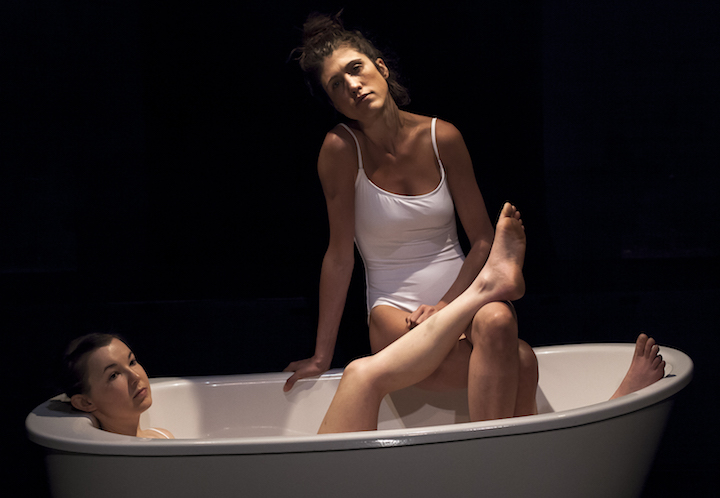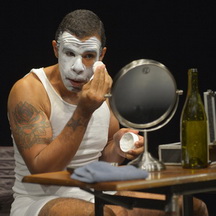This past weekend, Cal Performances presented Mouthpiece, a 65-minute performance piece developed by Amy Nostbakken and Norah Sadava of the Toronto–based theater group Quote Unquote Collective. Mouthpiece won the Stage Award for Performance at the Edinburgh Fringe Festival in 2017, and the Berkeley performance was the last stage presentation of the piece, which took three years to develop.
Mouthpiece has gone on to other manifestations, as a book by Canadian publisher, Coach House Press, and a film version directed by Patricia Rozema. But it’s difficult to imagine this spare and distilled performance piece as a film with cinema’s narrative realism.

As the audience wandered into to seat itself under the house lights, the open stage of Zellerbach Playhouse was dark with black walls and a solitary bathtub center stage, a microphone stand placed downstage and to the actors’ right. A single spot illuminated the white tub.
The lights faded and in the darkness two voices hummed in harmony. There was something quite beautiful about the sound as it hung in the dark space of the auditorium. When the lights came up again there were two women in the bathtub, one seated on the tub’s rim and the other lying with her feet in the lap of the seated woman. They were both wearing white camisole leotards, which they referred to in the course of the play as bathing suits.
These two women were aspects of the same woman, the voices within her head, if you will, as they argued, struggled and harmonized. The woman is a writer, Cassandra, whose mother has just died, and this newly abandoned daughter has necessary tasks to do: choose a coffin for her mother, select flowers for the funeral, pick out the dress for her mother to wear at the funeral and most daunting of all, to write and deliver the eulogy.
In seems, however, Cassandra is having trouble getting out of the bath. She explains, “My mother always told me you can heal almost everything in a hot bath.”
Over and over, one or the other of the women makes her way to the microphone, and tries to describe her mother. In one attempt, mother was a doormat, clad in a girdle and afraid to eat a French fry for fear of gaining weight. In another attempt, mother becomes a “ferocious Amazonian warrior.” As the dual Cassandra struggles to portray her mother, to become the mouthpiece for her mother’s life, she stumbles over the difficulties she, as a woman, has in speaking out and revealing who she herself is – inside. Difficulties that any and all women have when trying to be vocal and seen, that is to say, exist, in the world.
How language is gendered, even in the pitch and volume of women’s speech, and how behaviour is passed from mother to daughter enters into the dialogue between the Cassandras. It opens out into the audience when one half of Cassandra screeches out “Daddy!” and the women select two men from the audience to come onstage and move the bathtub. Giggling and bobbing up and down with gratitude they direct the men on how to move the tub, three steps forward, two steps back.
Finally, the men place the tub on its side, and it becomes the coffin Cassandra hides in while at the funeral home. The barelegged Cassandra curled inside the tub/ coffin takes on the chilling shape of a fetus in a whitely antiseptic womb.
And when the men have returned to audience for the second time, the two Cassandras lift the tub and reposition it on their own.
In a last mute struggle one woman reaches toward the microphone to make her eulogy and is physically pulled back by the other woman who then also tries to reach the mic but is pulled back by the first women. The pattern repeats and repeats until neither woman can reach the microphone, even without the other’s restraint. When they finally open their mouths, no words come out.
The entire performance of Mouthpiece is tightly choreographed and laced with songs that run a gamut of popular styles. It’s a formidable portrait of loss, both of someone loved and the self.
